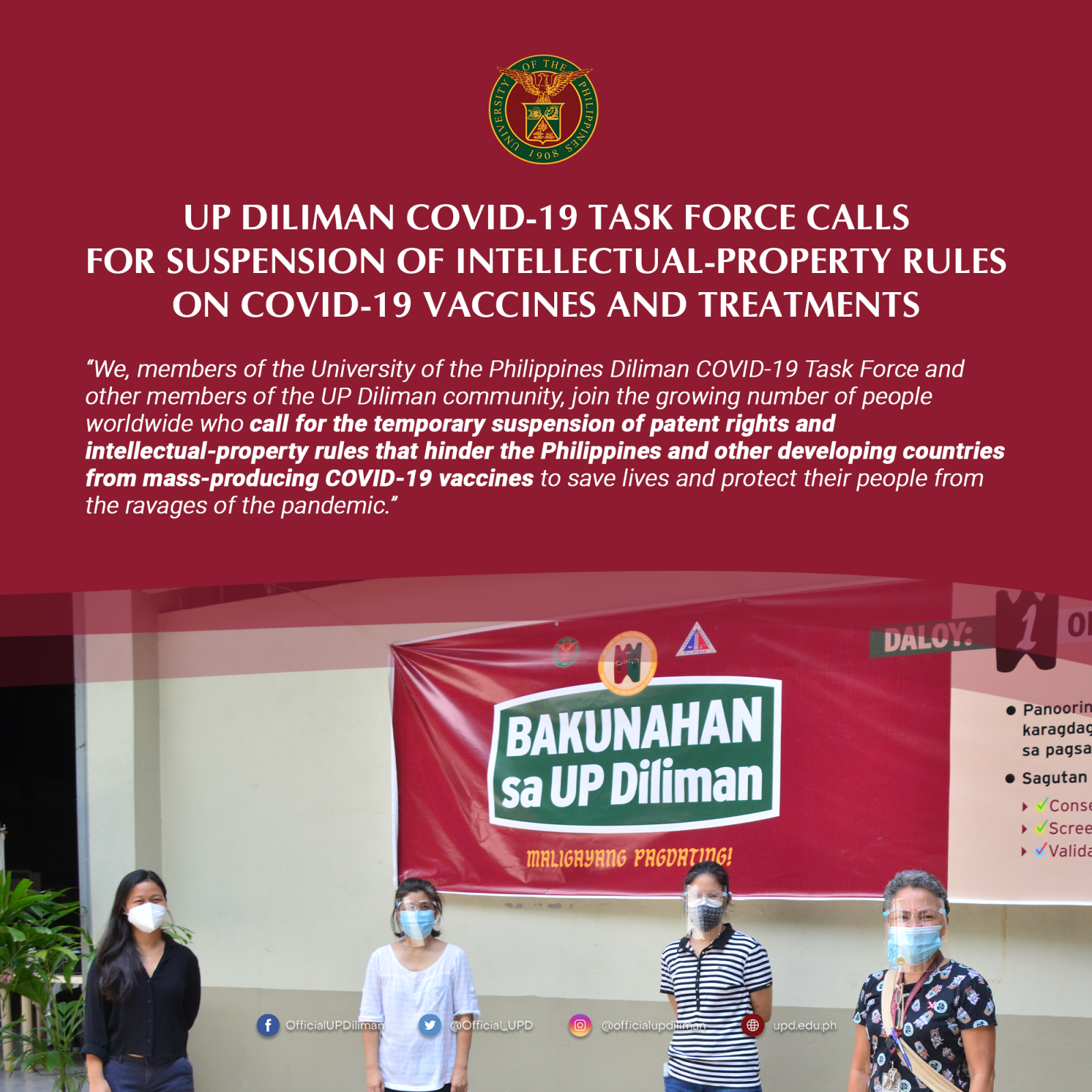We, members of the University of the Philippines Diliman COVID-19 Task Force and other members of the UPD community, join the growing number of people worldwide who call for the temporary suspension of patent rights and intellectual-property rules that hinder the Philippines and other developing countries from mass-producing COVID-19 vaccines to save lives and protect their people from the ravages of the pandemic.
In particular, we support the proposals of India, South Africa and other developing-country governments to temporarily waive the relevant provisions under the Trade-Related Aspects of Intellectual Property Rights (TRIPS) agreement under the World Trade Organization.
In the Philippines alone, the number of COVID-19 cases has breached the one million mark. In recent weeks, on average around 5,000 to 8,000 still get infected by the virus every day. Nearly 200 die daily. Unemployment and underemployment figures have worsened in the context of the pandemic; today, one in 10 Filipinos remain unemployed or underemployed.
We urgently need rapid nationwide immunization and immediate provision of life-saving treatment to as many people as possible. Key to making this happen are an adequate and affordable supply of vaccines, drugs, test kits, ventilators, masks, and other products needed for the prevention and treatment of COVID-19; and, no less important, the strong political will needed for government to push for vaccine sufficiency and equity, and a speedy and efficient vaccine rollout.
Instead, what we witness today are rampant vaccine inequality globally and inefficiencies in the national vaccine rollouts. According to the World Health Organization, over 80 percent of the 1.16 billion doses that have been administered benefited rich and middle-income countries while only 0.3 percent have trickled to developing countries like the Philippines. This is no accident: rich and powerful countries are hoarding much of the available vaccines and big pharmaceuticals are monopolizing the technology needed for developing countries to produce the vaccines for their own people.
With technology transfer and their existing resources and expertise, many drug companies in the Philippines and other developing countries can potentially cover the shortfall that giant drug companies are unable to provide. They can produce millions of doses of additional vaccines and help make it possible to inoculate 60 percent of the world this year and all those who want a vaccine by the end of 2022. But they are being prevented or hampered from doing so by the intellectual property provisions in the World Trade Organization’s Agreement on TRIPS. By refusing to sign a waiver of patent monopolies for the vaccines, big pharmaceuticals stand to profit the most from exclusive production and distribution rights to COVID-19 vaccines, even as they struggle to keep up with the global demand.
As a result, a humanitarian disaster is unfolding before our very eyes. In the Philippines and other countries like India, only a tiny fraction of the population have been inoculated, leading to untold deaths and suffering that could have largely been prevented. The window for achieving herd immunity also closes rapidly as more and more variants of the virus emerge amid the slow vaccine rollouts.
Unless the deficit in COVID-19 vaccines and treatments is covered, this disaster is bound to worsen. At the rate vaccines are being produced, majority of the population of developing countries such as the Philippines will not be inoculated until, at the latest, the end of 2024; by then, inoculation against COVID-19 would have been rendered outdated and moot, the economic collapse would have starved and sentenced thousands, and the death tolls would have rung too many times than should be conscionable to anyone who has any ability at all to intervene and prevent this from happening.
This is why we join the call for waiving the intellectual-property rules immediately: so that we can increase the supply of COVID-19 vaccines and other drugs worldwide and in so doing, save more lives, ease suffering and end the pandemic once and for all.
Today, confronted with an unprecedented global health and economic emergency, we encourage our fellow academics—including those in other universities—to join us in urging the Philippine government to adopt this clarion call to the international community. The mantra “no one is safe until everyone is safe” resonates now more than ever, underscoring the urgent need for global solidarity and cooperation.

